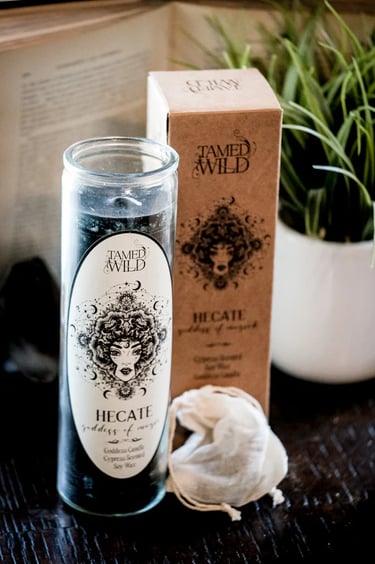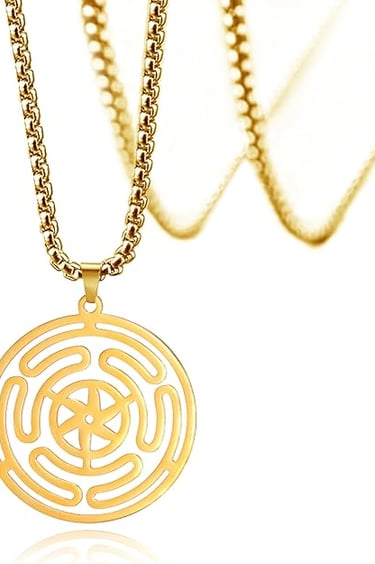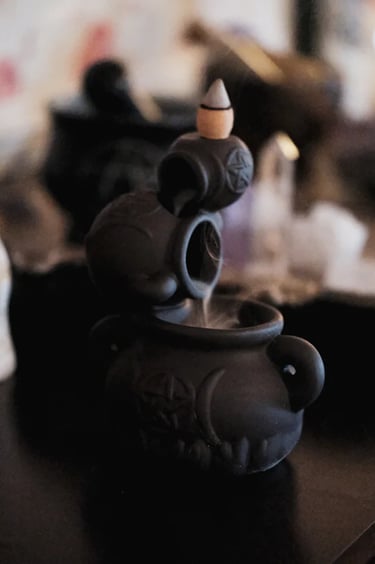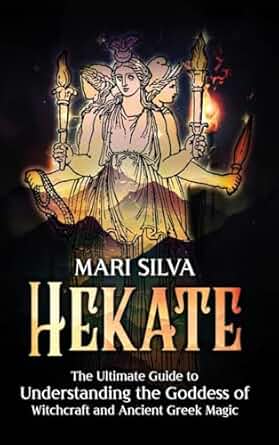Hecate, one of the most enigmatic figures of Greek mythology, is a goddess of profound power and wisdom. She is the guardian of thresholds, the mistress of magic, and the keeper of the crossroads where the mortal world and the divine intersect. Known for her associations with witchcraft, the moon, and the underworld, Hecate’s mythology offers rich symbolism and lessons about transformation, protection, and the unknown.
Let’s explore Hecate’s origins, her role in ancient mythology, and her enduring significance in the spiritual practices of today.
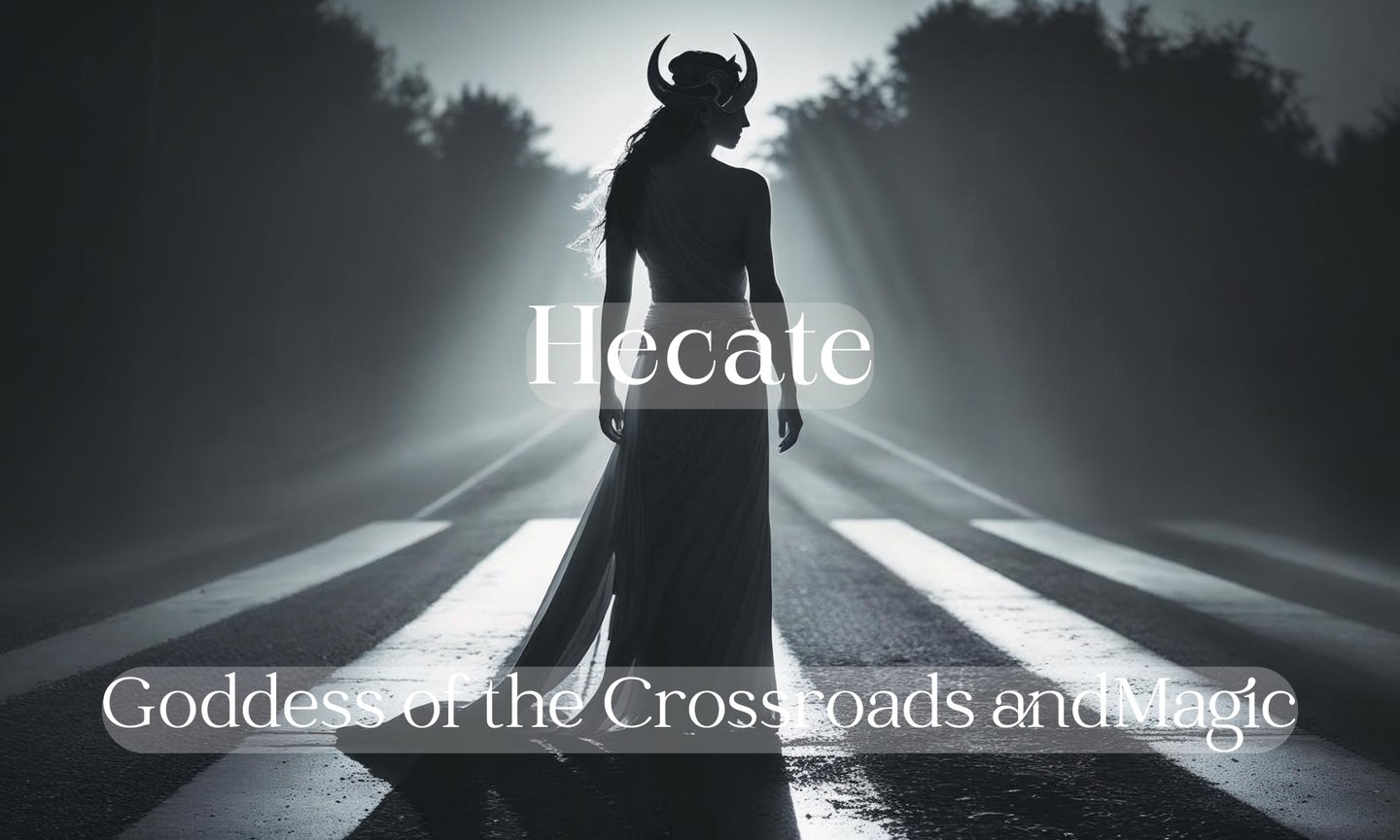

Hecate in Greek Mythology
Hecate’s origins are complex, and her mythology differs depending on the sources. She is often regarded as a pre-Olympian deity, honored before the rise of Zeus and his pantheon. Hesiod’s Theogony describes her as the daughter of the Titans Perses and Asteria, making her a goddess of both celestial and chthonic realms. She was uniquely respected by Zeus, who granted her dominion over the heavens, the earth, and the sea—a rare privilege among the gods.
Hecate’s power lies in her ability to traverse boundaries. She is associated with liminal spaces, such as crossroads, doorways, and thresholds, and her presence is felt in transitions, whether physical, emotional, or spiritual. As a goddess of the night, she is also linked to the moon and its phases, which align with the cycles of life, death, and rebirth.
The Abduction of Persephone
Hecate plays a pivotal role in the myth of Persephone. When the young goddess was abducted by Hades and taken to the underworld, Hecate heard her cries. Later, she guided Demeter, Persephone’s mother, through the night with her torches as they searched for the missing goddess. Hecate became a companion to Persephone and served as her guide in the underworld, embodying her role as a psychopomp—a guide of souls between realms.
Hecate at the Crossroads
In ancient Greece, crossroads were considered sacred spaces where offerings were left for Hecate, particularly during the Deipnon, the dark phase of the moon. Food offerings, called Hecate’s Suppers, were placed at crossroads to honor her and seek her blessings or protection. These locations symbolized choices, decisions, and transitions, aligning with Hecate’s role as a guide and protector during moments of uncertainty.
Key Myths of Hecate
Symbols and Associations of Hecate
Torches: Representing illumination in darkness, Hecate’s torches light the way through shadowed paths and unknown territories.
Keys: Symbolizing her ability to unlock hidden knowledge and mysteries, keys are sacred to Hecate as the guardian of thresholds.
Dogs: Often depicted with a black dog, Hecate is associated with loyalty and guardianship. Dogs were also believed to sense spirits, aligning with her role as a guide in the spiritual realm.
The Moon: As a lunar deity, Hecate is connected to the phases of the moon, especially the dark moon, a time of introspection and shadow work.
Honoring Hecate: A Simple Devotional Practice
To connect with Hecate, you can create a sacred space and offer her traditional symbols, such as:
Candles: Light a black or dark-colored candle to honor her presence.
Offerings: Leave food, such as bread, honey, garlic, or eggs, at a crossroads or on your altar.
Meditation: Sit quietly and visualize standing at a crossroads, asking Hecate for guidance. Imagine her illuminating the path forward with her torches.
Incense: Burn mugwort or myrrh, herbs sacred to Hecate, to invite her energy into your space.
Hecate’s Modern Spiritual Significance
Hecate remains a beloved figure in contemporary spiritual practices, particularly in witchcraft, paganism, and Wicca. She is often invoked for:
Guidance: During transitions or difficult decisions, Hecate provides wisdom and clarity.
Protection: As a guardian of thresholds, she shields against negative energies and spiritual dangers.
Shadow Work: Hecate’s connection to the underworld and the unknown makes her a powerful ally in exploring the subconscious and embracing personal transformation.
Magic: Her deep ties to witchcraft and the lunar cycles make her a patroness of spellwork and divination.
Conclusion
Hecate is a goddess of immense depth, embodying the mysteries of life, death, and transformation. Her mythological roles as a guide, protector, and keeper of magic resonate strongly in today’s spiritual practices, reminding us of the power within the unknown and the wisdom found in transition.
By honoring Hecate, we honor our own journeys of growth, shadow work, and personal empowerment, knowing that even in the darkest nights, her torches will light the way forward.


References to add to your magical library or grimoire
This page contains affiliate links*, meaning I may earn a small commission on qualifying purchases at no extra cost to you. Miss Dana's Wisdom showcases only products I personally use or genuinely believe my readers will love. Thank you for your support!

